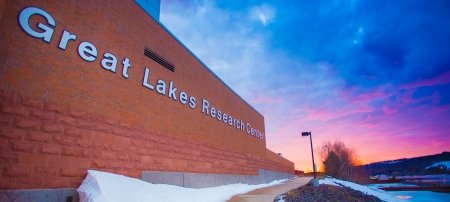Michigan Technological University is known for both its engineering and environmental know-how and its resources.
Add to that the School of Business and Economics, the Great Lakes Research Center (GLRC) and a campus-wide commitment to multidisciplinary work, and you have just what the US Environmental Protection Agency is looking for.
The EPA named Michigan Tech the new home of its Region 5 environmental finance center, a recognition that comes with a six-year grant of up to $5.6 million. EPA Region 5 covers Michigan, Minnesota, Wisconsin, Illinois, Indiana, and Ohio.
An EPA team will be at Tech to conduct a site visit on Sept. 13-14.
Engineering, Business Resources
“The depth of engineering resources that we have, our business school’s involvement and the fact that a multidisciplinary approach is the norm here all made our application stand out,” says Tim Colling. The principal investigator on the EPA center, Colling also directs Tech’s Center for Technology and Training (CTT), part of the Department of Civil and Environmental Engineering (CEE). There are several co-PIs from various University departments, centers and institutes, including CEE, the Sustainable Futures Institute, Michigan Tech Transportation Institute (MTTI) and the School of Business and Economics.
The new EPA regional center—one of 10 nationwide—will help counties, cities, villages, and state agencies find better ways to manage and maintain their infrastructure and to minimize their impact on the environment.
Infrastructure is a term used to describe the manmade systems that make modern society possible, such as bridges and roads, water and sewer systems, landfills and power generation systems. Infrastructure and the environment interact constantly and in complex ways. Bridges span bodies of water; storm drainage from roads affects the surrounding ecosystem. Plants and wildlife as well as the quality of the air, water and soil all depend upon infrastructure that functions properly.
Preventive Maintenance
Managing infrastructure, Colling says, is somewhat like car maintenance.
“If I don’t change the oil, rotate the tires and grease the moving parts, my car is likely to break down prematurely and, as a result, I will have some expensive repairs and will have to deal with inconveniences like being stuck on the side of the road,” explains Colling. “However, if I do all the required maintenance, my car is likely to last a lot longer, cost me much less over its life, and not leave me stranded. It’s the same idea for infrastructure—we have to constantly manage it and do preventive work. Like your car, if you didn’t save to replace it and had to buy a new one suddenly, the financial burden can be staggering.
“These are the challenges engineers deal with every day,” Colling goes on to say, “and there are no simple answers.”
The EPA center will receive baseline funding from the grant. Colling is expecting additional funding to come through applications for various projects for which Michigan Tech is well qualified. “Since this is a center focused on the Great Lakes area, we anticipate significant GLRC involvement,” he says.
Michigan Technological University is an R1 public research university founded in 1885 in Houghton, and is home to nearly 7,500 students from more than 60 countries around the world. Consistently ranked among the best universities in the country for return on investment, Michigan's flagship technological university offers more than 120 undergraduate and graduate degree programs in science and technology, engineering, computing, forestry, business, health professions, humanities, mathematics, social sciences, and the arts. The rural campus is situated just miles from Lake Superior in Michigan's Upper Peninsula, offering year-round opportunities for outdoor adventure.







Comments